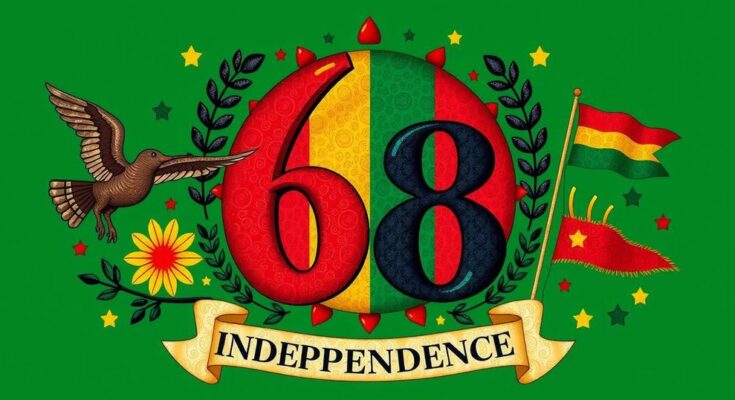Ghana marked its 68th independence anniversary on March 6, 2025, with scaled-back celebrations due to economic constraints. The theme for this year, “Reflect, Review, Reset,” underscores the need to evaluate the country’s progress since independence. While opinions on Ghana’s achievements vary, the nation boasts stability and an increase in tourism. The call for collective effort towards national development is highlighted as Ghanaians look forward to a brighter future.
On March 6, 2025, Ghana commemorated sixty-eight years of independence from British colonial rule, a significant milestone in the nation’s history. Traditionally, this occasion is celebrated with vibrant festivities and activities across the country, declared a public holiday. This year’s events, however, were notably toned down to mitigate expenses in light of the country’s economic constraints.
The independence anniversary parade, which typically features schoolchildren and security forces at Independence Square, was significantly scaled back, leading to an estimated savings of nearly 95% of the planned budget of 20 million cedis. The celebrations were limited, lacking the usual festive atmosphere in areas such as Osu, where traders typically benefit from increased economic activity.
Ghana’s Month in March is dedicated to showcasing national pride and identity. This year’s theme, “Reflect, Review, Reset,” encourages contemplation about the nation’s progress and challenges over the past sixty-eight years. Notably, Ghana, when likened to an employee under Labor Laws, could be considered to have “retired” eight years prior—prompting questions regarding the nation’s achievements over the decades.
Discussions surrounding Ghana’s progress yield divergent views. While some argue that Ghana has enjoyed relative success, particularly under the politically stable Fourth Republic since 1992, others contend that the nation lags behind peers such as Singapore and Malaysia in economic growth and living standards. Questions arise regarding the high prices of locally sourced goods, illustrating concerns about Ghana’s economic management despite abundant natural resources.
Moreover, Ghana’s industrialization efforts have faced setbacks that hindered job creation and economic stability, perpetuating a colonial economic structure. Continuous engagement with the International Monetary Fund (IMF) reflects a cycle of economic dependency, with educational reforms and socio-economic policies often failing to reach fruition.
Nevertheless, Ghana has seen notable successes worth celebrating, such as its unity in diversity and political stability, as well as its growing reputation as a premier tourist destination in Africa, attracting over one million visitors. The National Democratic Congress’s campaign, “Building the Ghana We Want,” serves as a motivational call for collective effort towards national betterment.
In conclusion, the 68th Independence Day serves as an important reminder for Ghanaians to reflect on their shared history and to collectively rally for a brighter future, embracing the spirit encapsulated in the National Anthem and Pledge. There is a strong sense of pride in the progress made, as Ghanaians continue to aspire for a greater tomorrow while affirming their identity and commitment to national development.
In summary, Ghana’s 68th independence anniversary reflects on the significant journey the nation has taken since 1957, amidst celebrations that were notably modest this year due to economic challenges. The call to “Reflect, Review, Reset” encapsulates the need for Ghana to evaluate its advances and obstacles over the past decades. As the nation strives for improvement, there is reason to celebrate both achievements and the enduring spirit of unity and resilience among Ghanaians. The future relies on collective commitment to growth and a stronger national identity.
Original Source: www.ghanaweb.com




